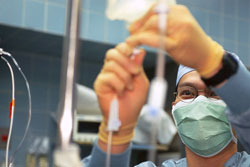Prostate cancer: Bernard’s journey
‘My Experience’: Surviving prostate cancer
Prostate cancer survivor Bernard talks to Virtual Medical Centre about the long journey through his disease. Ultimately, he says, having support and information is what can carry a sufferer through dark and uncertain times. ‘Bernie’ says he wants to talk openly about some of the oft-neglected aspects of prostate cancer – the aspects that men do not have to suffer alone.
“You can survive,” Bernie says.
“A lot of men just don’t have the information to even formulate their questions, whether they be about available treatments, side effects, or what happens afterwards, for example, erectile dysfunction.”
“There are many subjects like this that are often not canvassed, but you can talk to someone and get on with your life.”
Copping it sweet: The shock of diagnosis
 “Before the diagnosis, I would occasionally have a slow stream and it wasn’t alarming. It was only because my daughter kept badgering me to get my PSA tested that I even bothered doing anything at all; otherwise I would have never gotten checked.
“Before the diagnosis, I would occasionally have a slow stream and it wasn’t alarming. It was only because my daughter kept badgering me to get my PSA tested that I even bothered doing anything at all; otherwise I would have never gotten checked.
“If I hadn’t, it would have been too late.”
This is exactly why Bernie says men must get their prostate checked by their GP or even just go get a PSA reading. He implores Australian men to start monitoring their health and watching their PSA spikes, so they know what the norms are.
It turned out Bernie had a Gleason score of 9. He was only 52 years old.
“The urologist was even reluctant to operate, because at that stage it was bulging out of the capsule,” Bernie says.
“They said I could get it operated on if I wanted, but they didn’t expect any success at all. After the operation they said, ‘I don’t think we could have got it all, so you probably have about 18 months to live.'”
The fallout: Facing the future
After the shock of such a grim future, Bernie says he went straight to Church. He faced many dark days and eventually joined a support group. The prostate cancer support group helped both emotionally and practically, by providing the information he needed to get through the impending journey.
“When I first got diagnosed and was told I had only 18 months to live, I was wondering: well, when exactly is it going to happen?” he says.
“So I went online and put in my doubling rates and PSA readings into a US website, because they have different diagnostic techniques, to try desperately to find a prediction of what was going to happen in my future. But I couldn’t get any of these things to happen for me.
“The statistics showed I had no hope of survival. The hardest part was the ‘not-knowing’ and having no control. This thing is just eating away at you and you don’t know if it’s going to come back and bite you and if it does, how bad it’s going to bite you.
“What really reduced me to tears was how you can die with it. When you die of prostate cancer, it’s a painful way to go, one of the most torturous diseases inflicted upon men.
“I was faced with this future.
“I was really struggling. Then one day I was in Church and realised that no one knows when they’re going to drop off the perch. So I decided to stop worrying about it and just got on with life.” This, he says, is when the tide turned.
“So you have to be positive,” he says. “And when you meet men in a support group you discover we’re all survivors – that people do come out. Some people still take hormones, but they are surviving.”
The gruelling journey through treatment
 “I was put immediately on hormone therapy and then straight into radiation, as an adjunct to the full radical prostatectomy.
“I was put immediately on hormone therapy and then straight into radiation, as an adjunct to the full radical prostatectomy.
“It was a combination of those three treatments all at the same time. It took me a year to recover from the radiation, and the hormones knocked me around something terrible.
“They made an old man out of me; I could barely walk.
“Mentally I was tired, too. I took so many naps everyday. As soon as I sat down I’d fall asleep, even at a stranger’s house. It was terrible. I couldn’t walk 100 metres without taking a rest, and I would get hot flushes.
“I didn’t get many side effects from the radiation, although many people can suffer terrible bowel problems, skin rashes, incontinence, burning and other symptoms.
“During the hormone therapy, yes, I think I would have been depressed.”
The depression and mental fatigue Bernie suffered is part of the most difficult challenges of surviving a disease, which is why Australian health authorities and cancer support groups are ready and waiting for anyone in this position, as well as for the families of sufferers.
It is important for sufferers and survivors to share their experiences and have a wealth of information to make the best decisions for their own treatment and mental health. As Bernie shows us, there is a beautiful and full life waiting after cancer.
Man to man: Talking about life after prostate cancer
Bernie explains how there are so many side effects and challenges arising as a result of prostate cancer that are virtually unknown and, more frustratingly, rarely discussed.
For example, having surgery and going through painful treatment does not necessarily mean a man cannot experience a rewarding sexual life afterwards. It also doesn’t mean a man will not be able to perform sexually.
“I decided to have a penile implant,” Bernie says. “In addition, there are many ways to please yourself and your partner. There are many types of treatments and equipment available.
 “Sometimes you don’t want to go to a GP or nurse and talk about the most intimate parts of your sexual life, so it is really beneficial to join a support group and be able to sit down with another man and discuss it over a cup of coffee. I can talk openly about the benefits and how to come out of all of this.”
“Sometimes you don’t want to go to a GP or nurse and talk about the most intimate parts of your sexual life, so it is really beneficial to join a support group and be able to sit down with another man and discuss it over a cup of coffee. I can talk openly about the benefits and how to come out of all of this.”
Another challenge Bernie faced, as do many men, was post-surgery urinary problems. After receiving radiation, Bernie’s body started to heal, so a scricture formed. This is a blockage that can occur where they rejoin the urethra to the bladder.
“So they told me they could open it back up but they could only do this once, otherwise they would have to put an artificial sphincter in there to keep it open. So I had to use these catheter tubes just to force it to stay open, and they’re about 2 feet long.
“You have to be really careful with this process. You can’t just put a catheter ‘up there’ then take it out, because there are all sorts of germs and bacteria that can give you urinary tract infections. So you must make sure you do it during a shower.
“They said I might have to do this for the rest of my life. After 18 months of this, I saw a drop of blood so I went to the doctor and luckily he said it was healed and I didn’t have to use it any more.
“However, after the surgery I did lose some of my length – that I’ll never get back.”
These are just some of the things that are not well known and not often talked about, he says.
Money men: Financial matters
Everybody can get stressed about money, or lack thereof, and this is certainly true when we are faced with potentially expensive procedures and medications. But Bernie can put minds at rest.
Bernie does not have private health insurance but says it hasn’t cost him a penny.
“I had the operation at Royal Perth, then I had the radiation at Sir Charles Gardiner. The hormone therapy and even the injections are worth $1,800 each, but it’s covered, so it didn’t cost anything.
 “The penile implant normally costs $22,000 but it didn’t cost me anything because I had the surgery for prostate cancer. I asked about it and normally you can’t get covered, but I thought, if women can get breast augmentation surgery covered after breast cancer then men should be entitled to this procedure, especially for young men in active, healthy relationships.”
“The penile implant normally costs $22,000 but it didn’t cost me anything because I had the surgery for prostate cancer. I asked about it and normally you can’t get covered, but I thought, if women can get breast augmentation surgery covered after breast cancer then men should be entitled to this procedure, especially for young men in active, healthy relationships.”
Unfortunately for prostate cancer survivors, the penile implant is not automatically covered by Medicare. However, for those interested in following Bernie’s process, he recommends doing what he successfully did.
Firstly, Bernie went to former Health Minister Jim McGinty.
“He told me it was not in his jurisdiction, so I was forwarded on to Chief Medical Officer Simon Towler. I had my health report and a letter explaining why this should be covered, and so he approved the procedure.
“Six months later I received the surgery.”
Support
Bernie says the great asset provided by support groups is information. Being diagnosed with cancer is terrifying, largely because a sufferer can feel like they have no control. However, Bernie says, having the tools and support to face all the challenges is what can help somebody through.
More information
 | To learn more about how other men are dealing with this disease, visit Aussie men share their prostate cancer experiences. |
 | For more information on prostate cancer, including diagnoses, types of treatments, and some useful tools, videos and animations, see Prostate Cancer. |
Diseases relevant to this personal experience:
Dates
Tags
Created by:

 Login
Login














